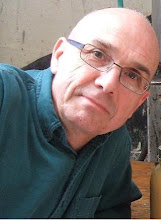www.cjly.net, Mondays at 6:30 am PST
 Anouar Brahem: Aube Rouge à Grozny, Astara, Karakoum, and Blue Jewels from Astrakan Café (ECM)
Anouar Brahem: Aube Rouge à Grozny, Astara, Karakoum, and Blue Jewels from Astrakan Café (ECM)
When I travelled to Greece as a young man I occasionally heard, in recorded music in cafes and in the street, an otherworldly kind of clarinet playing, very enticing, not like the usual Greek bouzouki music, and nothing like the clarinet technique or style I had learned in school. Then I travelled to Turkey and got a glimpse of the other world those clarinets were calling out from.
One of the highlights of this CD for me is the presence of Barbaros Erkose, a gypsy clarinetist from Istanbul. Even though I stopped playing the clarinet decades ago, I still understand its language. Listening to this CD and I am thrilled by the wildness and sophistication of Erkose's playing. The tone he gets on his clarinet is like nothing I have ever heard: the ones we are used to are jazz and classical and maybe klezmer, and this is none of those.
Anouar Brahem, the leader of the trio on this CD, likens his inspiration to "the tree which, while rising above the ground and taking up more space, continues to develop and dig its roots deeper into the ground," an image appropriate to his home city of Tunis, a multifaceted place with Arabic-Moslem roots and African and Mediterranean influences.
Anouar Brahem is a celebrated player of the oud, which is an Arabic version of the lute. He was born in 1957 in Tunisia and by the age of 10 had entered the Tunisia Conservatory of Music and by 15 was playing with local orchestras. Since then he has reinvigorated traditional Tunisian music and has experimented with other Arabic traditions as well, with the result today being a body of work that spans the entire Arabic and European worlds. In addition to being a solo performer with small and large groups, he has worked as an orchestra director and teacher, and has written music for film, theatre, and dance. The third musician in this trio is percussionist Lassad Hosni.
Henryk Szeryng: Partita No.3 E Major BVW 1006, from Bach: The Unaccompanied Sonatas and Partitas (Odyssey)
 The Polish violinist Henryk Szeryng became a citizen of Mexico part way through this life for some fascinating reasons.
The Polish violinist Henryk Szeryng became a citizen of Mexico part way through this life for some fascinating reasons.
In World War II, Szeryng, already a prominent violin soloist in Poland and a scholar who spoke eight languages, became chief liaison officer for the Polish government in exile in London. At the same time, he gave hundreds of concerts for Allied troops all over the world. In 1942 he went to Mexico where the Polish president in exile was searching for a home for thousands of Polish refugees displaced by the war. Mexico accepted them, and Henryk Szeryng was so moved by this humanitarian gesture that he returned to Mexico in 1943, where he was offered the post of director of the string department at the National University of Mexico. In recognition of his musical and cultural contribution, he was granted Mexican citizenship in 1948.
He regularly gave concerts all over Latin America until his friend the pianist Arthur Rubenstein persuaded him to extend his solo career further afield, and this began several decades of concerts, recordings, and acclaim worldwide.
Szeryng was appointed Mexican Roving Ambassador for Culture in 1956 and Special Music Advisor to the Mexican Permanent Delegation to UNESCO. He was the first artist ever to travel on a diplomatic passport.
Henryk Szeryng died in September, 2008. His memorial website is here: http://www.henrykszeryng.net/
His recording of Bach's Sonatas and Partitas for solo violin is one of the highlights of his career, and of this radio show. About Bach, Szeryng said, "Johann Sebastian Bach's work is a Bible. Bach is the ultimate goal, this is where everything starts and everything ends. His music brings you closer to your own spirit, even to analyzing your own spirit and soul. It has an incredible serenity. If people think that a choral or an Adagio, a Cantilena produces this miracle, I would say that even fast movements, a Presto or a quick Allegro, can make you feel more cheerful, more secure, more optimistic."
Herbie Hancock: Maiden Voyage from Maiden Voyage (Blue Note)This is part two of my tribute to jazz trumpeter Freddie Hubbard, who died recently at age 70. This classic recording from 1965 captures the essence of a certain spirit of adventure that produced effortless flight at Blue Note records in the 1960's, and it is one of Hubbard's finest performances. On this track you can hear his thoughtfulness, his exuberance, and his complete focus within the open harmonies of Hancock's new direction. George Coleman, Tony Williams, and Ron Carter shared the date.
The vinyl LP my listeners heard here is the very one I bought when Maiden Voyage was first released. I realized in the radio studio that the record doesn't sound so great any more. It's worn out. I need to buy the CD.
Aldo Ciccolini: Trois Gymnopédies from Piano Music of Eric Satie Volume 1 (Angel)
A few months ago I went to see the film Man on Wire, and last night watched it again with my daughter, and I was struck both times by how perfect this piece was for the final scenes when Philippe Petit walked a tightrope between the tops of the twin towers in New York. http://manonwire.com/









